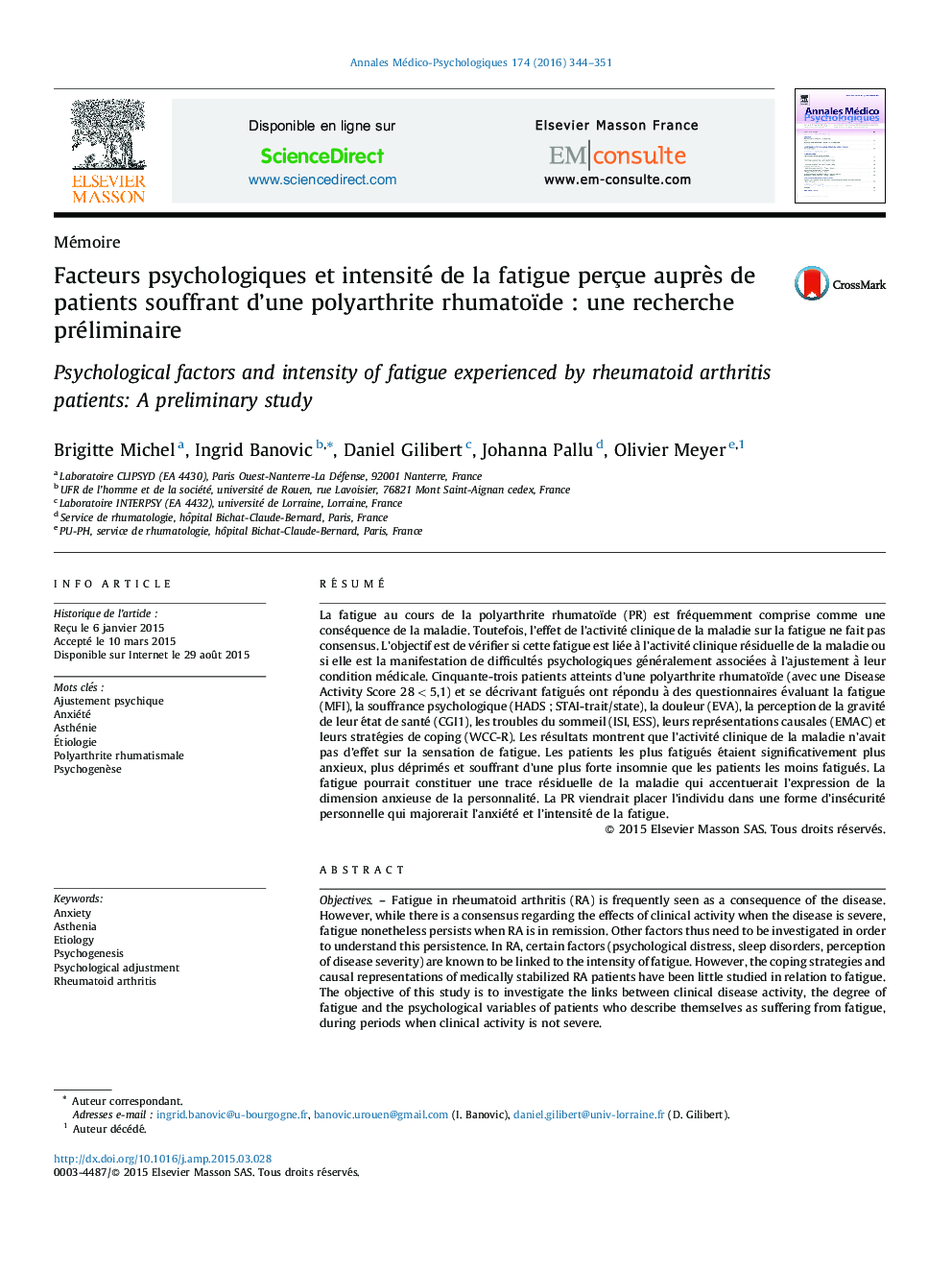| کد مقاله | کد نشریه | سال انتشار | مقاله انگلیسی | نسخه تمام متن |
|---|---|---|---|---|
| 312210 | 534193 | 2016 | 8 صفحه PDF | دانلود رایگان |

RésuméLa fatigue au cours de la polyarthrite rhumatoïde (PR) est fréquemment comprise comme une conséquence de la maladie. Toutefois, l’effet de l’activité clinique de la maladie sur la fatigue ne fait pas consensus. L’objectif est de vérifier si cette fatigue est liée à l’activité clinique résiduelle de la maladie ou si elle est la manifestation de difficultés psychologiques généralement associées à l’ajustement à leur condition médicale. Cinquante-trois patients atteints d’une polyarthrite rhumatoïde (avec une Disease Activity Score 28 < 5,1) et se décrivant fatigués ont répondu à des questionnaires évaluant la fatigue (MFI), la souffrance psychologique (HADS ; STAI-trait/state), la douleur (EVA), la perception de la gravité de leur état de santé (CGI1), les troubles du sommeil (ISI, ESS), leurs représentations causales (EMAC) et leurs stratégies de coping (WCC-R). Les résultats montrent que l’activité clinique de la maladie n’avait pas d’effet sur la sensation de fatigue. Les patients les plus fatigués étaient significativement plus anxieux, plus déprimés et souffrant d’une plus forte insomnie que les patients les moins fatigués. La fatigue pourrait constituer une trace résiduelle de la maladie qui accentuerait l’expression de la dimension anxieuse de la personnalité. La PR viendrait placer l’individu dans une forme d’insécurité personnelle qui majorerait l’anxiété et l’intensité de la fatigue.
ObjectivesFatigue in rheumatoid arthritis (RA) is frequently seen as a consequence of the disease. However, while there is a consensus regarding the effects of clinical activity when the disease is severe, fatigue nonetheless persists when RA is in remission. Other factors thus need to be investigated in order to understand this persistence. In RA, certain factors (psychological distress, sleep disorders, perception of disease severity) are known to be linked to the intensity of fatigue. However, the coping strategies and causal representations of medically stabilized RA patients have been little studied in relation to fatigue. The objective of this study is to investigate the links between clinical disease activity, the degree of fatigue and the psychological variables of patients who describe themselves as suffering from fatigue, during periods when clinical activity is not severe.MethodsParticipants were 53 patients with rheumatoid arthritis (DAS28 < 5.1) who complained of fatigue. They answered questionnaires evaluating fatigue (MFI), psychological distress (Hospital Anxiety and Depression Scale; STAI-trait/state), sleep disorders (ISI, Epworth Daytime Sleepiness), pain (EVS), perception of the severity of their state of health (CG11), their causal representations (Échelle Multidimensionnelle d’Attributions Causales) and coping strategies (WCC-R). Patients were compared in terms of clinical disease activity and level of fatigue. The relationships between variables were analysed using Spearman's rank correlation coefficient.ResultsThe clinical disease activity did not have any effect on the sensation of fatigue, or on the other dimensions investigated. The only significant difference concerned the controllability of the disease by caregivers: patients with an active disease perceived the controllability of the disease by their caregivers to be significantly lower than did patients with an inactive disease. The comparison of patients with regard to intensity of fatigue shows that the patients with the highest level of fatigue were significantly more anxious; more depressed and had more severe insomnia than patients with the lowest level of fatigue. Finally, correlation coefficients revealed significant links between the overall fatigue score (MFI) and insomnia, psychological distress (HQDS, state anxiety) and trait anxiety. Not only does the degree of disease activity (DAS28) appear to be unrelated to fatigue, but coping strategies, causal representation and disease severity were also found to be unrelated to the intensity of fatigue.ConclusionFatigue thus appears to be linked less to clinical disease activity than to more specific psychological factors. An anxious personality trait could constitute a factor of vulnerability to fatigue in an RA patient. Fatigue should thus be considered not only specifically for each medical context but also more individually. More specifically, the relationships between the different psychological levels and mechanisms involved should be examined from an integrative perspective.
Journal: Annales Médico-psychologiques, revue psychiatrique - Volume 174, Issue 5, June 2016, Pages 344–351